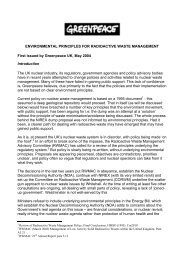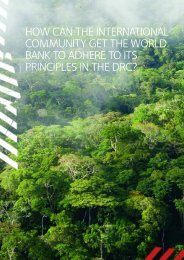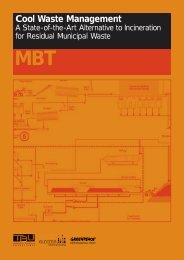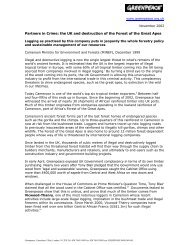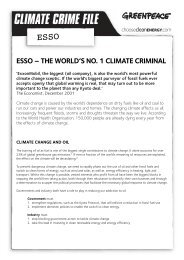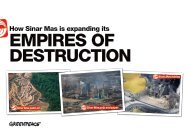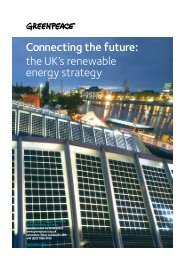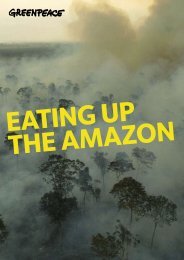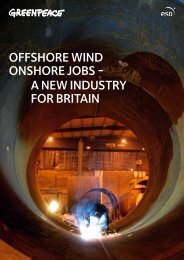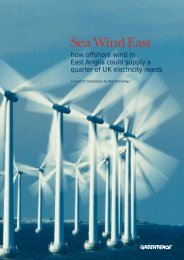Download Executive Summary - Greenpeace
Download Executive Summary - Greenpeace
Download Executive Summary - Greenpeace
Create successful ePaper yourself
Turn your PDF publications into a flip-book with our unique Google optimized e-Paper software.
4<br />
CARVING UP THE CONGO<br />
overlap areas inhabited by pygmy<br />
hunter-gatherers.<br />
A third of the contracts are inside areas<br />
already identified as priority landscapes for<br />
conservation. Twenty of those contracts are<br />
located wholly or partially within the Congo<br />
Basin Forest Partnership’s Maringa-Lopori-<br />
Wamba landscape, critical bonobo habitat.<br />
A third of the contracts are located in areas<br />
with afrormosia, a protected tree species<br />
whose international trade is supposed to<br />
be strictly regulated (listed under CITES<br />
Appendix II).<br />
Challenges for the Legal Review<br />
Is the contract a straight violation of the<br />
2002 moratorium?<br />
<strong>Greenpeace</strong> research shows:<br />
s Companies, including Trans-M, seem to<br />
have taken over areas previously occupied<br />
by ‘non-compliant titles’ cancelled in April<br />
2002. Many of these contracts are located<br />
within intact forest landscapes.<br />
The implications of these findings are<br />
serious: such violations would mean that the<br />
cancellation of non-compliant titles in April<br />
2002 did little more than take logging rights<br />
from speculative owners who did not use them,<br />
freeing up space for new logging operations.<br />
Do logging contracts comply with ‘boundaries<br />
as defined by the contract and the<br />
topographical map attached to said contract’?<br />
As <strong>Greenpeace</strong> research shows:<br />
s Both NST group companies and the Danzer<br />
group (Siforco) – which between them hold<br />
more than 5 million hectares of rainforest<br />
– redefined many of their contracts and<br />
title boundaries after the moratorium was<br />
decreed in 2002 and in advance of the<br />
legal review. Only through detailed<br />
comparison of old and revised maps and<br />
boundaries can it be assessed whether the<br />
revised boundaries include new forest areas<br />
and therefore would be illegal under the<br />
May 2002 moratorium. Yet, such pre- and<br />
post-moratorium maps or contracts are<br />
not publicly available.<br />
s ITB’s current forest holdings in Equateur<br />
Province appear to be located in areas<br />
formerly held by cancelled non-compliant<br />
pre-2002 contracts and are larger then<br />
the forests controlled by ITB before the<br />
moratorium. Final conclusive analysis is<br />
lacking because logging title maps both<br />
pre- and post-moratorium are not<br />
publicly available.<br />
Assessment of the legality of revisions to premoratorium<br />
contracts (for instance, where a<br />
company has returned forest area to the State)<br />
should therefore include assessment of the<br />
original contracts and maps as well as revised<br />
documents to ensure there are no irregularities.<br />
Will the legal review overlook issues of<br />
corruption and failures of governance?<br />
<strong>Greenpeace</strong> research suggests that issues of<br />
corruption require close scrutiny for companies<br />
including CFBC (a company said to have links<br />
with the former rebel leader Jean-Pierre<br />
Bemba), ITB, Trans-M, Danzer group (Siforco),<br />
NST group (Sodefor) and Olam. Issues include:<br />
s Payments to forestry officials;<br />
s Subcontracting (which is illegal, but<br />
companies may use loopholes in the<br />
Forestry Code);<br />
s Historic payment of funds to rebel-held<br />
administrations;<br />
s Titles issued in wartime; and<br />
s Political protection afforded to<br />
certain companies.<br />
Conclusion: the World Bank has so far failed<br />
in its objectives of controlling the<br />
expansion of industrial logging and<br />
improving governance of the sector. In the<br />
absence of enforcement, the moratorium<br />
has been a cover for behind-the-scenes<br />
jostling for valuable forest holdings.<br />
‘We are seeing today an<br />
emerging global consensus<br />
that we must do something<br />
about climate change. If we<br />
do so, we have a chance to<br />
put the world on a path that<br />
not only reduces the damage<br />
to our climate, but also allow<br />
poor countries to keep more<br />
of their resources rather than<br />
pay for growing fuel bills<br />
– a path that allows them<br />
to preserve their forest for<br />
their own benefit and the<br />
world’s benefit.’ 3<br />
Paul Wolfowitz,<br />
World Bank President




![[2007] EWHC 311 - Greenpeace UK](https://img.yumpu.com/22079793/1/184x260/2007-ewhc-311-greenpeace-uk.jpg?quality=85)

